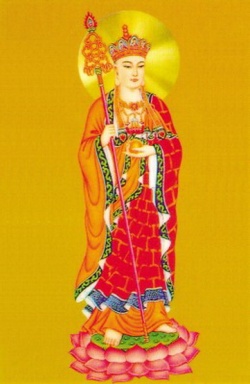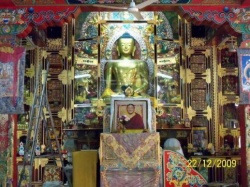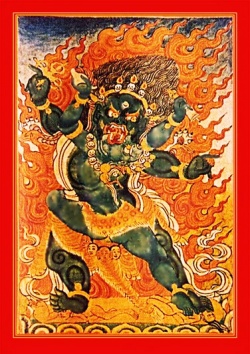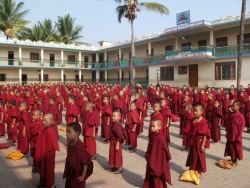The Difficulty of Evangelizing in Thailand
Brian C. Stiller, Global Ambassador for The World Evangelical Alliance, laments the failure of hordes of mega-funded missionaries to convert Buddhists in Thailand to his brand of Christianity...
The Difficulty of Evangelizing in Thailand
"...Speaking with pastors, educators, mission leaders and on-the-ground spiritual inventors, I heard it time after time. I tried to understand the question in context in a land of lush landscape, neighborhoods so remarkably clean and people incredibly respectful and kind. The question is this: After all the people, money and years, why is the Christian mission here so small?"
"...Why is that after over 183 years of evangelical missionary work, an investment of thousands of lives and millions upon millions of dollars, out of a total population of 65 million there are only 370,000 evangelical Christians, one half of one percent?"
"...I heard many reasons. Among them missionaries viewing Thais as unequal to the task of leadership held on to controls within their foreign mission boards.
In this brief dispatch, rather than analyze the past, my interest is in their current vision and plan. I wanted to hear from them their optimism and hope for discipleship and church growth.
The national plan was in part triggered by polling which showed the Thai people didn't find the words "Jesus" and "God" objectionable, an assumption many made on why the slowness of Gospel advance [sic]. In 2004 the DeMoss Foundation organized the Power for Living campaign which asked the Thais if they found those words offensive. They then invited people to call in to receive a book. Organizers estimated a couple hundred thousand would call. Surprised, some 2.9 million responded."
Why should Buddhists find 'Jesus' objectionable? Jesus was a Bodhisattva who developed his teachings in Buddhist India. And why should the word 'God' be objectionable? According to some views, 'God' is just another word for the Dharmakaya.
So the slowness of Gospel advance may be due to other factors, for example the need to believe the literal truth of this...It's likely that in order to make progress, the evangelists will need to launch an attack on the Thai educational system to suppress science, as they have done very successfully in formerly Buddhist South Korea.
By Brian C. Stiller
As I travel from country to country, meeting leaders, pastors, people from all walks of life, I'm intrigued by the health and energy of the witness of the Gospel.
I've heard much about Thailand from missionaries over the years. However, on a recent visit one question kept surfacing. Speaking with pastors, educators, mission leaders and on-the-ground spiritual inventors, I heard it time after time. I tried to understand the question in context in a land of lush landscape, neighborhoods so remarkably clean and people incredibly respectful and kind. The question is this: After all the people, money and years, why is the Christian mission here so small?
Thailand, one of the South East Asian "Tigers," while looking somewhat like Malaysia and Myanmar (Burma), is as different as Canada is to the USA or Sweden to Germany. Never colonized, in the 19th century it negotiated land for freedom to keep out of the clutches of France and Great Britain, unlike Vietnam, Laos, Myanmar and Cambodia. Today, its national personality is to avoid conflict, all the while moving about, keeping face and not losing position.
National pride is palatable. Pictures of the king -- currently the longest living king -- and queen dot the landscape. Politicians are vilified but dare to offer criticisms of its royalty and the gentle Thai will rise in defense. Royalty is linked to nationalism. It didn't take but a few minutes in a major museum to hear their unqualified patriotism describing the greatness of their nation, its leaders, history and people. While Christian leaders tend to be modest, when it comes to pride in their nation, the marketing machine whirrs.
Completing the trilogy of national character -- along with royalty and nationalism -- is Buddhism. A Thai is expected to be Buddhist. To be other is seen as rejecting one's nationhood, tantamount to denying identity. Not surprising, evangelism has to buck the rapids of such a profound synthesis of nation and person.
Powerful and overwhelming is their fixation on Buddhism. More than the presence of temples and the role of temple attendance is to much of life, is their understanding and fear of the spirit world. Everywhere there are spirit houses, small shrines outside of homes, offices, restaurants, places of business and amulets hanging in taxis. Its core reason is to appease the spirits. For the Thai, fear of the many spirits is controlling.
However back to the question asked by many: Why is that after over 183 years of evangelical missionary work, an investment of thousands of lives and millions upon millions of dollars, out of a total population of 65 million there are only 370,000 evangelical Christians, one half of one percent?
I heard many reasons. Among them missionaries viewing Thais as unequal to the task of leadership held on to controls within their foreign mission boards.
In this brief dispatch, rather than analyze the past, my interest is in their current vision and plan. I wanted to hear from them their optimism and hope for discipleship and church growth.
The national plan was in part triggered by polling which showed the Thai people didn't find the words "Jesus" and "God" objectionable, an assumption many made on why the slowness of Gospel advance. In 2004 the DeMoss Foundation organized the Power for Living campaign which asked the Thais if they found those words offensive. They then invited people to call in to receive a book. Organizers estimated a couple hundred thousand would call. Surprised, some 2.9 million responded.
Rev. Dr. Wiracha Kowae, founder of the Assemblies of God and chairman of the Evangelical Fellowship of Thailand (EFT), identified a key reason for their current optimism. Today, he noted, the Thai church is not run by foreigners. His comments were early defined in 1951 by a Chinese Christian leader (it was called the Three Self Patriotic Movement or TSPM) with three mandates: self governing, self propagating, self funding. While the China cultural revolution under Mao repressed all religions, the Christian church grew in part given its newly found ability to self govern, self propagate and self fund.
Further, as more move from rural to urban, the old ways made rigid by a lack of education and loyalty to their religion is shaken, opening minds to other views and sets of values.
Wirachai also noted when Yongi Cho from South Korea spoke to pastors in the 1980s, they realized how much they were limiting what God could do. He noted Dr. Cho, raised in poverty, built the largest church in the world. This was a wake-up call to pastors who didn't include parking lots in their building plans because they never thought they would have members with cars.
In addition, important to their growing hope for spiritual renewal is an understanding that without generosity and mission, churches stay moribund, listless without growth. One pastor noted missionaries usually assumed the Thais didn't have much to give, so they didn't challenge them. The Gospel was free, they were told. There was no need for them to give materially. Linked to giving is their growing vision for mission: to not just be recipients from other countries but to engage themselves in going.
Within the broader culture the government came to see their need for Christian support. As Muslims grew, they increased their demands. Killings in three south provinces by Islamists moved the government to be more supportive of Christians, now not seen as a threat to the nation. While this does not directly contribute to evangelism, for the Christian community to be more positively viewed by a majority Buddhist country, helps frame how Christians and their beliefs are understood and viewed.
Undoubtedly their optimism is rooted in their reliance on indigenous leadership. National churches, colleges, seminaries and mission initiatives are being led by Thais.
Enoch Yattasak Sirikul is an example. A former student communist agitator, almost killed in the 1977 coup, he came to faith and today leads a national movement, linking churches, agencies and missions under a plan to train volunteers to disciple others.
Sirikul and Wolfe in a recent analysis identify two critical factors enabling the Vision 2015 plan. The current prayer movement in Thailand started with the Bless Thailand Prayer Network in 1996. Today, networks work together in an annual 40 days of prayer and fasting.
They asked in their research, "How do you get almost 80% of the Protestant churches and other ministries to agree on a national plan to reach their country?" Vision 2015 brought together three main Protestant communities: The Church of Christ Thailand (American Presbyterians and Baptists, Disciples of Christ, and others with 26 schools and eight hospitals); The Evangelical Fellowship of Thailand (122 mission organizations, 43 church associations, and nine institutions); The Thailand Baptist Convention.
The 2004 tsunami helped further unite the Thai Church under "We Love Thailand" assisting tsunami victims.
Thailand is a country to watch. Overshadowed by Buddhism and a culture that assumes being Thai and Buddhist are one and the same, how will this current vision break through barriers which has so bridled the Gospel? What I didn't hear was how the campaign faces the Thais' fear of the world of spirits, a fear so endemic in the entire culture.
After so many years of mission, now in the hands of its own people, we pray for its vision, that the Spirit will destroy strongholds, wielded in faith by men and women who in prayer will not be fooled by cultural missteps but wise in grace and truth.
Led by its own, funded increasingly by its people and expanding by their own efforts is an interesting mission plan, outlined years ago in the most unlikely place, China.





